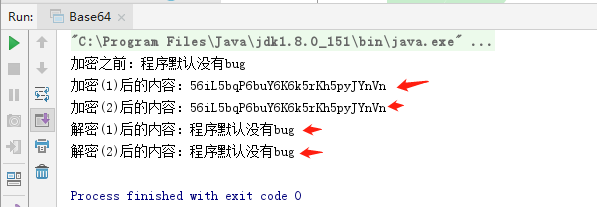Base64加密作为最简单普遍的加密方式(其实只能称为编码方式),应用场景众多比如秘钥,安全证书,也应用在其他的加密方式中或与其他加密方式进行嵌套使用
可以通过引用sun.misc来使用,也可以自己手动封装工具类(不会受第三方改动的影响,我一般采用这个),目前测试,两种加解密结果都一样,具体如下;
(1)直接引用(jdk版本1.8)及测试如下:
package com.mobile.utils; import sun.misc.BASE64Decoder; import sun.misc.BASE64Encoder; import java.io.IOException; /** * Created by Administrator on 2017/10/25. */ public class Base64 { public static void main(String[] args) throws IOException { String content = "程序默认没有bug"; System.out.println("加密之前:" + content); // 加密 BASE64Encoder encoder = new BASE64Encoder(); String encode = encoder.encode(content.getBytes()); System.out.println("加密后的内容:" + encode); // 解密 BASE64Decoder decoder = new BASE64Decoder(); String decode = new String(decoder.decodeBuffer(encode)); System.out.println("解密后的内容:" + decode); } }
运行结果如下:

(2)手动封装Base64工具类及测试如下:
package com.demo.utils; import java.io.ByteArrayOutputStream; import java.io.IOException; import java.io.OutputStream; import java.io.UnsupportedEncodingException; /** * Created by Administrator on 2017/10/25. */ public class Base64 { private static final char[] legalChars = "ABCDEFGHIJKLMNOPQRSTUVWXYZabcdefghijklmnopqrstuvwxyz0123456789+/".toCharArray(); public static String encode(byte[] data) { int start = 0; int len = data.length; StringBuffer buf = new StringBuffer(data.length * 3 / 2); int end = len - 3; int i = start; int n = 0; while (i <= end) { int d = ((((int) data[i]) & 0x0ff) << 16) | ((((int) data[i + 1]) & 0x0ff) << 8) | (((int) data[i + 2]) & 0x0ff); buf.append(legalChars[(d >> 18) & 63]); buf.append(legalChars[(d >> 12) & 63]); buf.append(legalChars[(d >> 6) & 63]); buf.append(legalChars[d & 63]); i += 3; if (n++ >= 14) { n = 0; buf.append(" "); } } if (i == start + len - 2) { int d = ((((int) data[i]) & 0x0ff) << 16) | ((((int) data[i + 1]) & 255) << 8); buf.append(legalChars[(d >> 18) & 63]); buf.append(legalChars[(d >> 12) & 63]); buf.append(legalChars[(d >> 6) & 63]); buf.append("="); } else if (i == start + len - 1) { int d = (((int) data[i]) & 0x0ff) << 16; buf.append(legalChars[(d >> 18) & 63]); buf.append(legalChars[(d >> 12) & 63]); buf.append("=="); } return buf.toString(); } private static int decode(char c) { if (c >= 'A' && c <= 'Z') return ((int) c) - 65; else if (c >= 'a' && c <= 'z') return ((int) c) - 97 + 26; else if (c >= '0' && c <= '9') return ((int) c) - 48 + 26 + 26; else switch (c) { case '+': return 62; case '/': return 63; case '=': return 0; default: throw new RuntimeException("unexpected code: " + c); } } /** * Decodes the given Base64 encoded String to a new byte array. The byte array holding the decoded data is returned. */ public static byte[] decode(String s) { ByteArrayOutputStream bos = new ByteArrayOutputStream(); try { decode(s, bos); } catch (IOException e) { throw new RuntimeException(); } byte[] decodedBytes = bos.toByteArray(); try { bos.close(); bos = null; } catch (IOException ex) { System.err.println("Error while decoding BASE64: " + ex.toString()); } return decodedBytes; } private static void decode(String s, OutputStream os) throws IOException { int i = 0; int len = s.length(); while (true) { while (i < len && s.charAt(i) <= ' ') i++; if (i == len) break; int tri = (decode(s.charAt(i)) << 18) + (decode(s.charAt(i + 1)) << 12) + (decode(s.charAt(i + 2)) << 6) + (decode(s.charAt(i + 3))); os.write((tri >> 16) & 255); if (s.charAt(i + 2) == '=') break; os.write((tri >> 8) & 255); if (s.charAt(i + 3) == '=') break; os.write(tri & 255); i += 4; } } public static void main(String[] args) throws UnsupportedEncodingException { String content = "程序默认没有bug"; System.out.println("加密之前:" + content); // 加密 String jiami = Base64.encode(content.getBytes("utf-8")); System.out.println("加密后的内容:" + jiami); // 解密 String jiemi = new String(Base64.decode(jiami)); System.out.println("解密后的内容:" + jiemi); } }
测试运行结果:

两者加解密结果比较:

两种加解密结果相同